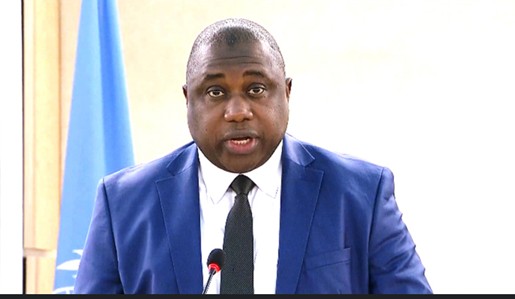
Addressing the gathering, the Justice minister delivered a sobering update on the status of The Gambia’s constitutional reform, a cornerstone of the country’s broader transitional justice agenda.
“Mine is a brief one,” he began, reflecting on the years-long effort to replace the 1997 Constitution, which was enacted during military rule. “We all remember the 2020 draft constitution, the first serious attempt to usher in a Third Republic. Unfortunately, that effort failed to pass the required two-thirds majority in the National Assembly, and we now find ourselves in a similar situation again.”
The Minister revealed that following the 2020 setback, government initiated a series of political dialogues both locally and internationally, facilitated to build consensus on key contentious issues. Religious leaders, civil society representatives, and even former heads of state and UN officials participated in what he described as “eminent dialogue,” aimed at restoring public trust and political will around constitutional reform.
These dialogues culminated in the revised 2024 Promulgation Bill, which retained about 85% of the original 2020 draft while amending approximately 15% of its content. The bill passed the first reading in parliament but, once again, fell short of the supermajority required to proceed to the consideration stage gathering only 35 out of the needed 43 votes, with 21 lawmakers voting against it.
“By constitutional requirement, this marked the end of that legislative process,” the Minister declared, expressing disappointment but reiterating the government’s unwavering resolve. “Despite two failed attempts, we are not giving up. We will revisit our approach, redesign the process, and consult with our partners on the way forward.”
He stressed that although the reform hit another dead end, The Gambia is not in a constitutional crisis. “We still have a functioning constitution, but what Gambians desire is a document that reflects their democratic aspirations not one inherited from a military regime.”
The Minister argued that a new constitution is not just a legal necessity but a symbolic milestone in the country’s transition from authoritarianism to democracy. Key proposed reforms such as presidential term limits, affirmative action, and an expanded bill of rights are crucial to anchoring democratic governance and human rights in law.
“In my view, the transitional justice process will not be complete without constitutional reform. The constitution is the line that divides the past from the present. Without it, we cannot claim a full transition,” he emphasised.
While he declined to disclose alternative proposals currently under consideration, the Minister assured the public and development partners that government remains committed to pursuing constitutional reform “by whatever means can take us to that destination.



